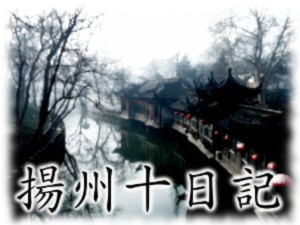揚州十日記 translation: Diary of the Ten Days of Yangzhou, Part 2
This is Part 2 in an annotation of 揚州十日記(‘Diary of the Ten Days of Yangzhou’). Like [吳城日記](http:// eastasiastudent.net/china/classical/wucheng-riji-1/ “吳城日記translation: Diary of Inner City Suzhou, Part 1”), it’s a daily log from the year 1645, a year after the Manchus took Beijing, marking the end of the Ming dynasty and the beginning of the Qing (明末清初).
This diary covers the Yangzhou massacre (also known as “The Ten Days of Yangzhou”), and was written by 王秀楚 (Wang Xiuchu). You can read about these events, as well as see more translations of the text, in Lynn A. Struve’s book Voices from the Ming-Qing Cataclysm.
As always, if you notice a mistake or have any suggestions, please share them in the comments at the end of the page.

越次早,督鎮牌諭至“內有一人當之,不累百姓”之語,聞者莫不感泣。 The next morning, the Regional Military Commander [Shi Kefa] and made an announcement saying: "I take on all responsibility myself; the common people will not be implicated" ; of those who heard this, there were none who were not moved to tears. (Shi Kefa has taken on all responsibility for resisting the Manchus, ie he intends to save the common people of the city by taking all blame himself.)
又傳巡軍小捷,人人加額焉。 We then heard that the [Ming] patrolling army had gained a small victory, and everybody put their hands to their heads in celebration.
午後,有姻氏自瓜洲來避興平伯逃兵(興平伯高傑也,督鎮檄之,出城遠避)。 In the afternoon, someone in my wife's family came from Guazhou fleeing the Count of Xingping's defecting army (the Count of Xingping is Gao Jie; the Regional Military Commander put out a warrant for his arrest, so he left the city walls and fled far away ). (Gao Jie is this person’s actual name, and he also held the title ‘Count of Xingping’. I think!)
予婦緣別久,相見唏噓; My wife was fated to a long separation [from this relative] , and they sobbed upon seeing each other;
而敵兵入城之語,已有一二為予言者。 there was word of enemy soldiers entering the city walls - there were one or two people who had already told me about it.
予急出詢諸人,或曰:“靖南侯黃得功援兵至。” I hurried outside about to ask various people, and some of them said: "It's reinforcements arriving for Marquis Huang Degong of Jingnan."
旋觀城上守城者尚嚴整不亂,再至市上,人言洶洶,披髮跣足者繼塵而至,問之,心急口喘莫知所對。 I immediately looked at the guards on the city walls, and they were still in strict order and not in upheaval; I also went to the marketplace, and people were speaking in torrents; there were people with their hair let down and their feet bare, stirring up the dust with their arrival; I asked them - they panted hurriedly but there were none who knew how to answer.
忽數十騎自北而南,奔馳狼狽勢如波湧,中擁一人則督鎮也。 Suddenly several people riding horses came from the north, heading south; they were rushing from disaster with the force of a torrent; amongst them they carried a man - it was the Regional Military Supervisor [Shi Kefa] .
蓋奔東城外,兵逼城不得出,欲奔南關,故由此。 They were intending to rush out of the east gate, but the [enemy] soldiers were pressing down on the city walls and they couldn't get out, so they were going to head for the southern gate, thus passing through here.
是時,始知敵兵入城無疑矣。 At that moment, it was the first time I knew that the enemy soldiers had entered the city walls without doubt.
突有一騎由北而南,撤韁緩步,仰面哀號,馬前二卒依依轡首不捨,至今猶然在目,恨未傳其姓字也。 Suddenly one rider passed through from the south to the north; he had let go of the reins and trotted slowly, his face upward and wailing in anguish; in front of the horse were two soldiers reluctant to let go of the reins; to this day it is still before my eyes, and I regret that I did not find out his surname and given name.
騎稍遠,守城丁紛紛下竄,悉棄冑拋戈,並有碎首折脛者,回視城櫓已一空矣! When the rider was a little distance away, the soldiers guarding the city walls scurried down one after another, all of them abandoning their helmets and chucking away their spears; furthermore, there were those who cracked their heads and broke their ankles; I looked back at the turrets on the city wall, and they were already completely empty!
[← Part 1](/china/classical/yangzhou-shiri-ji-1/” rel="prev “揚州十日記translation: Diary of the Ten Days of Yangzhou, Part 1”) · Part 2 · [Part 3 →](/china/classical/yangzhou-shiri-ji-3/” rel="next “揚州十日記translation: Diary of the Ten Days of Yangzhou, Part 3”)
Sources
Series: Diary of the Ten Days of Yangzhou
- 揚州十日記 translation: Diary of the Ten Days of Yangzhou, Part 1
- 揚州十日記 translation: Diary of the Ten Days of Yangzhou, Part 2 (this article)
- 揚州十日記 translation: Diary of the Ten Days of Yangzhou, Part 3
- 揚州十日記 translation: Diary of the Ten Days of Yangzhou, Part 4
- 揚州十日記 translation: Diary of the Ten Days of Yangzhou, Part 5
- 揚州十日記 translation: Diary of the Ten Days of Yangzhou, Part 6
- 揚州十日記 translation: Diary of the Ten Days of Yangzhou, Part 7
- 揚州十日記 translation: Diary of the Ten Days of Yangzhou, Part 8
- 揚州十日記 translation: Diary of the Ten Days of Yangzhou, Part 9
- 揚州十日記 translation: Diary of the Ten Days of Yangzhou, Part 10
- 揚州十日記 translation: Diary of the Ten Days of Yangzhou, Part 11
- 揚州十日記 translation: Diary of the Ten Days of Yangzhou, Part 12
- 揚州十日記 translation: Diary of the Ten Days of Yangzhou, Part 13
- 揚州十日記 translation: Diary of the Ten Days of Yangzhou, Part 14
- 揚州十日記 translation: Diary of the Ten Days of Yangzhou, Part 15
- 揚州十日記 translation: Diary of the Ten Days of Yangzhou, Part 16
- 揚州十日記 translation: Diary of the Ten Days of Yangzhou, Part 17
- 揚州十日記 translation: Diary of the Ten Days of Yangzhou, Part 18
- 揚州十日記 translation: Diary of the Ten Days of Yangzhou, Part 19
